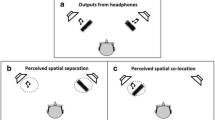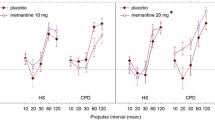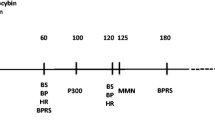Abstract
Rationale: Prepulse inhibition (PPI) of the startle reflex is a measure of sensorimotor gating, that is the processing of the startle stimulus (S2) is inhibited by the interfering processing of a closely preceding prepulse (S1). It has been demonstrated that PPI is disrupted in a variety of mental disorders and that several neurotransmitter systems, including dopamine, participate in the modulation of sensorimotor gating. Previous studies have also shown that a task-relevant S1 enhances PPI in healthy subjects but not in schizophrenic patients. These findings indicate an influence of attentional processes on sensorimotor gating and an impairment of this modulation in schizophrenia. Objective: Assuming a dopamine-mediated suppression of S1 processing as a mechanism of resource management and selective attention, which might be impaired in certain mental disorders, the present study investigated the effects of the indirect dopaminergic agonist d-amphetamine on prepulse-altered S2 discrimination and event related potentials (ERPs). Methods: Twelve healthy volunteers were tested in a double-blind, placebo-controlled experimental design. Here, S2 is the target in a difficult Go/NoGo auditory discrimination task. Results: Confirming our previous results, S2 processing is ”accentuated” by a weak acoustic prepulse in healthy subjects, thus leading to a lower rate of errors of omission but also to more false alarms (i.e. a liberal response bias). This performance change correlated with a prepulse-induced increase in the amplitude of the P3 ERP towards non-targets (”prepulse-induced non-target positivity”; PINTP). In addition, the results of the present study show that under prepulse conditions amphetamine disrupts ”S2 accentuation” associated with a dose-related reduction of the P2 component of the S1 response and a plasma level related reduction of PINTP. Conclusions: These data suggest an involuntary attentional shift towards S1 processing with increasing dopamine-release similar to that observed in patients with schizophrenia or OCD. It is concluded that sensory gating alters selective attention via dopaminergic modulation.
Similar content being viewed by others
Author information
Authors and Affiliations
Additional information
Received: 30 March 1998 / Final version: 10 February 1999
Rights and permissions
About this article
Cite this article
Kröner, S., Schall, U., Ward, P. et al. Effects of prepulses and d-amphetamine on performance and event-related potential measures on an auditory discrimination task. Psychopharmacology 145, 123–132 (1999). https://doi.org/10.1007/s002130051040
Issue Date:
DOI: https://doi.org/10.1007/s002130051040




